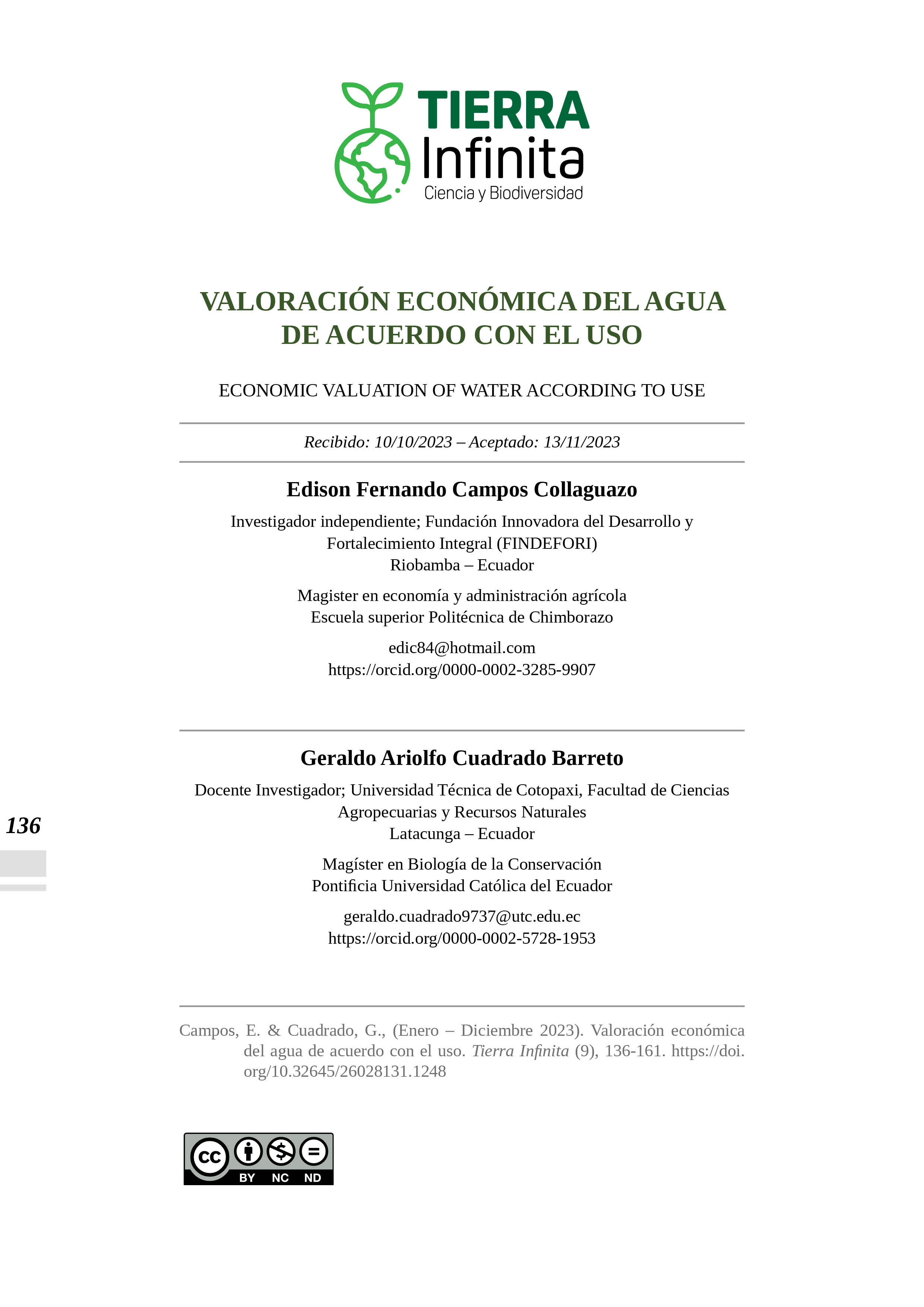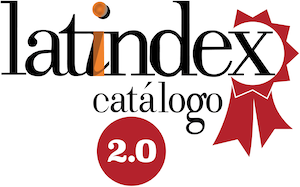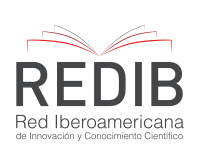ECONOMIC VALUATION OF WATER ACCORDING TO USE
DOI:
https://doi.org/10.32645/26028131.1248Keywords:
Economic valuation, Water, Water use, reviewAbstract
The paper reviews several scientific studies on the economic valuation of water and its importance in different contexts. Different methods used to measure the value of water are suggested, such as integrative valuation of ecosystem services, contingent valuation, revealed valuation, and assessment of willingness to pay for improvements in water quality. Being a review article a metadata analysis was performed in the Scopus platform where the words valuation, economic, water were used, restrictions were applied in relation to: periodicity from 2010 to the present, limited to environmental sciences, economics, econometrics and finance, biological sciences and agriculture; in the titles sciences of the whole environment, environmental management and ecological economics; the filtered language is English in which the scientific articles were written, the main objective is to systematize each of the 100 researches, a base document of consultation for future studies in economic valuation of water is structured. Descriptive analysis was applied using the "R" program, including bibliometrix and biblioshiny. The importance of considering water quality in the estimation of benefits is highlighted, since households are willing to pay more for better quality drinking water. It is mentioned that water quality varies according to perceptions and factors such as age, trust in the authorities, health problems and education. The amount of income in a family is not a determining factor in the willingness to pay for water-related ecosystem services; respondents with higher levels of education and higher incomes are willing to pay more. Studies on the economic valuation of water in different countries, such as China, the United States, the United Kingdom, Kenya and Canada, are reported; these studies use different methods to obtain data on the preferences and willingness to pay of local residents, and the results are used to inform water policy and management decisions. The main conclusion is that water valuations, whether for public, private or intermediate production use, will not have objective significance unless they are accompanied by policies and decision-making by local, sectional, provincial, national authorities and governments of the day that allow for equitable conservation and commercialization for both conservers and users.
References
Ahlheim, M. a. (2015). Towards a Comprehensive Valuation of Water Management. Water, 2472-2493.
Alcon, F., Marín-Miñano, C., Zabala, J. A., de-Miguel, M.-D., & Martínez-Paz, J. M. (2020). Valuing diversification benefits through intercropping in Mediterranean agroecosystems: A choice experiment approach. Ecological Economics, 171. https://doi.org/10.1016/j.ecolecon.2020.106593
Anjinho, P. da S., Barbosa, M. A. G. A., & Mauad, F. F. (2022). Evaluation of InVEST’s Water Ecosystem Service Models in a Brazilian Subtropical Basin. Water (Switzerland), 14(10). https://doi.org/10.3390/w14101559
Artel, J. (2013). Lots of value? A spatial hedonic. Journal of Environmental Planning and, 862-882.
Artell, J. &. (2013). Subjective vs. objective measures in the valuation of water quality. Journal of Environmental Management, 288-296.
Ashagre, B. P. (2018). Integrated modelling for economic valuation of the role of forests and. Ecosystem Services, 50-61.
Awad, I. M. (2010). Applying Contingent Valuation Method to Measure the Total Economic Value of Domestic Water Services: A Case Study in Ramallah Governorate, Palestine. European Journal of Economics, Finance and Administrative Sciences, 76-93.
Balana, B. B. (2014). Assessing the willingness to pay for reliable domestic water supply via catchment management: results from a contingent valuation survey in Nairobi City, Kenya. Journal of Environmental Planning and Management, 1511-1531.
Belkhir, C. O. (2016). Cleanup and valuation of waters of the aquifer of M’zab Valley (Algeria). JOURNAL OF WATER AND LAND DEVELOPMENT, No. 29, 1429-7426.
Chakraborty, M. R. (2013). Developing a sustainable water resource management strategy. Clean Techn Environ Policy, 341-349.
Chatterjee, C. a. (2017). Willingness to pay for safe drinking water: A contingent valuation. Journal of Environmental Management, 413-421.
Chen, S. W. (2018). Adapting ecological risk valuation for natural resource damage assessment. Environmental Research, 85-92.
Choi, I.-C. a.-N.-J. (2016). Willingness to Pay for a Highland Agricultural Restriction Policy to ImproveWater Quality in South Korea: Correcting Anomalous Preference in Contingent Valuation Method. Water, 8, 547, 1-19.
Cline, S. a. (2010). COMBINING NON-MARKET VALUATION AND INPUT– OUTPUT ANALYSIS FOR COMMUNITY TOURISM PLANNING: OPEN SPACE AND WATER QUALITY VALUES IN COLORADO, USA. Economic Systems Research, 385-495.
Edens, B. C. (2014). Experimental valuation of Dutch water resources. Water Resources and Economics, 66-81.
Eleshmawiy, K., Gadow, I. S., Kabary, H., Saber, M., Ali, D., Abu-Sedars, S., Mansour, H., & Zaghloul, A. (2022). Economic Valuation of Irrigating Tomato Plants With Agricultural Drainage Water Remediated With Dhs Technology. Journal of Pharmaceutical Negative Results, 13(6), 2777–2789. https://doi.org/10.47750/pnr.2022.13.S06.357
Ekin Birol, P. K. (2010). Assessing the economic viability of alternative water resources in water-scarce. Ecological Economics 69, 839-847.
Espaillat, W. F. (2014). Willingness to pay for reliable supplies of safe. Urban Water Journal, 284-292.
Ferrini, S. a. (2014). Revealed and stated preference valuation and transfer: A within- sample comparison of water quality improvement value. Water Resources Research, 4746-4759.
Feuillette, S. a. (2016). The use of cost–benefit analysis in environmental policies: Some issues raised by the Water Framework Directive implementation in France. Environmental Science & Policy, 57, 79-85.
Fontana, V., Ebner, M., Schirpke, U., Ohndorf, M., Pritsch, H., Tappeiner, U., & Kurmayer, R. (2023). An integrative approach to evaluate ecosystem services of mountain lakes using multi-criteria decision analysis. Ecological Economics, 204. https://doi.org/10.1016/j.ecolecon.2022.107678
Fuentes-Cortés L.F., M. Y.-O.-M. (2016). Valuation of water and emissions in energy systems. Applied Energy, en prensa.
Griffiths, C. a. (2012). U.S. Environmental Protection Agency. Policy Monitor, 130-146.
Guerrini, A. a. (2018). Levers supporting tariff growth for water services: evidence from a. Journal of Environmental Management, 23-31.
Jianjun, J. a. (2016). Measuring the willingness to pay for drinking water quality improvements: results of a contingent valuation survey in Songzi, China. Journal of Water and Health, 504-512.
Justes, A. a. (2014). Economic valuation of domestic water uses. Science of the Total Environment, 712-718.
Kassahun, H. T. (2016). Accounting for user expectations in the valuation of reliable irrigation. Agricultural Water Management, 45-55.
Lee, J.-S. (2013). Measuring the economic benefits of residential. Urban Water Journal, 252-259.
Li, L., He, C., Li, J., Zhang, J., & Li, J. (2023). The supply and demand of water-related ecosystem services in the Asian water tower and its downstream area. Science of the Total Environment, 887. https://doi.org/10.1016/j.scitotenv.2023.164205
Liquetea, C. a. (2018). Integrated valuation of a nature-based solution for water pollution control. Highlighting hidden benefits. Ecosystem Services, 1-10.
Luz Selene Buller, I. B. (2013). Dynamic emergy valuation of water hyacinth biomass in wetlands: an. Journal of Cleaner Production, 1-11.
Makrickas, E., Manton, M., Angelstam, P., & Grygoruk, M. (2023). Trading wood for water and carbon in peatland forests? Rewetting is worth more than wood production. Journal of Environmental Management, 341. https://doi.org/10.1016/j.jenvman.2023.117952
Medvedeva, O. E., Tikunov, V. S., & Artemenkov, A. A. (2022). Assessment of Ecosystem Services of Water Resources of Port Water Areas By the Amount of Water Rent. InterCarto, InterGIS, 28, 510–522. https://doi.org/10.35595/2414-9179-2022-2-28-510-522
Mesa-Jurado, C. A.-M. (2017). Valuation of Hidden Water Ecosystem Services: The Replacement Cost of the Aquifer System in Central Mexico. Water volumen 9, 571.
Meyera, J. O. (2018). Comparing Contingent Valuation and Averting Expenditure stimates. Ecological Economics, 250-264.
Moreno, C. R.-S.-A.-A. (2015). The economic value of conjoint local management in water resources: Results from a contingent valuation in the Boquerón aquifer (Albacete, SE Spain). Science of the Total Environment 532, 255-264.
Othman, J. G. (2014). Benefits valuation of potable water quality improvement in Malaysia: the case of Kajang Municipality. International Journal of Water Resources Development, 621-634.
Pande, S. a. (2011). Water valuation at basin scale with application to western India. Ecological Economics, 2416-2428.
Ren, Y. a. (2018). Valuation and Pricing of Agricultural Irrigation Water Based on Macro and Micro Scales. Water, Volume 10, Issue 8, 1-13.
Reya, D. ,. (2016). Agricultural Water Management. Agricultural Water Management 173, 13-22.
Reynauda, A. a. (2017). Going green? Ex-post valuation of a multipurpose water infrastructurein Northern Italy. Ecosystem Services, 70-81.
Roas, J. A. (2006). VALORACION ECONOMICA DEL AGUA. Merida, Venezuela: Centro Interamericano de Desarrollo e Investigación Ambiental y Territorial, CIDIAT. .
Rosalind H. Bark, M. J. (2018). Integrated valuation of ecosystem services obtained from restoring. Ecosystem Services, en prensa.
Söderberg, M. a. (2013). Marginal WTP and Distance Decay: The Role of ‘Protest’ and ‘True Zero’ Responses in the Economic Valuation of Recreational Water Quality. Environ Resource Econ, 389-405.
Stengera, A. (2009). Valuing environmentalgoodsandservicesderivedfrom the forests. Sciencie direct, 1-14.
Sxpakowska, D. Ś. (2013). AN ECOSYSTEM VALUATION METHOD FOR SMALL WATER BODIES. Ecological Chemistry and Engineering, 397-418.
Tait, P. a. (2012). Nonmarket valuation of water quality: Addressing spatially heterogeneous. Ecological Economics 75, 15-21.
Tussupova, K. a. (2015). Investigating Willingness to Pay to Improve Water Supply. Water, 3024-3039.
Vásquez, W. F. (2013). A Hedonic Valuation of Residential. Applied Economic Perspectives and Policy, 661-678.
Vivian C.S. Hackbarta, G. T. (2017). Theory and practice of water ecosystem services valuation: Where are we. Ecosystem Services, 228-227.
Wang, W., Zhuo, L., Rulli, M. C., & Wu, P. (2022). Limited water scarcity mitigation by expanded interbasin physical and virtual water diversions with uneven economic value added in China. Science of the Total Environment, 847. https://doi.org/10.1016/j.scitotenv.2022.157625
Ward, F. A. (2023). Integrating water science, economics, and policy for future climate adaptation. Journal of Environmental Management, 325. https://doi.org/10.1016/j.jenvman.2022.116574
Wubalem, A., Woldeamanuel, T., & Nigussie, Z. (2023). Economic Valuation of Lake Tana: A Recreational Use Value Estimation through the Travel Cost Method. Sustainability (Switzerland), 15(8), 1–20. https://doi.org/10.3390/su15086468
Xu, H. Z. (2016). An evaluation of the ecological and. Scientific reports, 1-12.
Yazid, M. a. (2015). Water Service Valuation in Tidal Lowland Agriculture. SOCIAL SCIENCES & HUMANITIES, 23, 39-46.
Yazid, M., Shamsudin, M. N., Rahim, K. A., Radam, A., & azizi, M. (2015). Valoración del servicio de agua en la agricultura de las tierras bajas de las mareas. Revista Pertanika de Ciencias Sociales y Humanidades, 39-46.
Yedra, H. a.-J.-M. (2016). Economic valuation of irrigation water in southeastern Mexico. International Journal of Water Resources Development, 1-13.
Zhang, J. a. (2013). Assessing the extent of altruism in the valuation of community drinking water quality improvements. WATER RESOURCES RESEARCH, 6286-6297.

Downloads
Published
Issue
Section
License
Copyright (c) 2023 MSc.Edison Fernando Campos Collaguazo, MSc. Geraldo Ariolfo Cuadrado Barreto

This work is licensed under a Creative Commons Attribution-NonCommercial-NoDerivatives 4.0 International License.
El autor mantiene los derechos intelectuales y morales de su obra, autorizando a la editorial de la Revista Tierra Infinita la difusión y divulgación de su contenido con fines estrictamente académicos y de investigación, sin fines de lucro.










